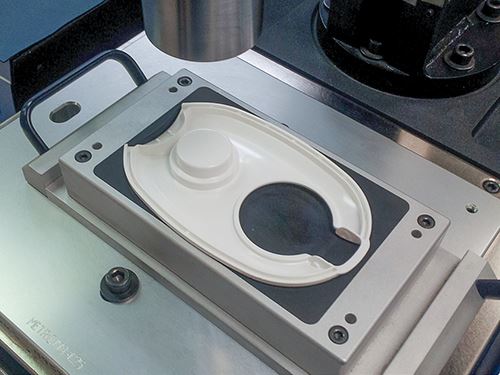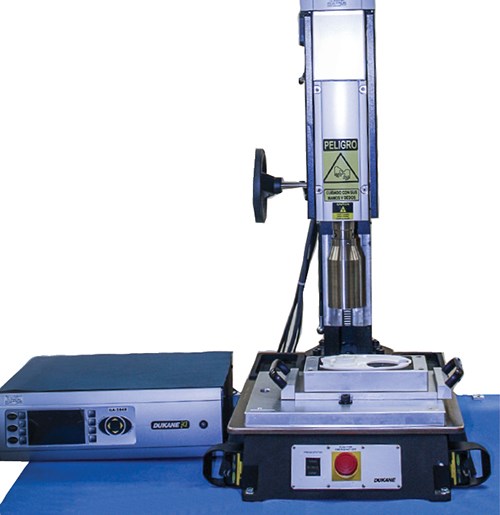Servo Welder Gives Molder More Control
Applications that require near-hermetic seals are now easily achieved by this electronic contract manufacturer.
The recent purchase of a servo-driven ultrasonic welder is giving custom injection molder KeyTronicEMS a greater level of control than previously used pneumatic systems. Based in Spokane, Wash., KeyTronicEMS is using the iQ Series servo-controlled ultrasonic welding system from Dukane, St. Charles, Ill., to weld the HIPS housing of a household water-filter tracking device, which allows the consumer to track filter life after a pitcher has been filled and emptied repeatedly.
For Duane Mackleit, v.p. of program management for KeyTronicEMS, the enhanced level of control provided by the welding system is a huge boost. In the past, the molder had completed a number of projects that required a near-hermetic seal through an ultrasonic welded joint. The firm had found this task ranged from challenging to nearly impossible due to variations in weld energy and inconsistencies in part geometry—particularly when the weld surface was non-planar.
The iQ Series welders feature Dukane’s proprietary Melt-Match technology. Mackleit says KeyTronicEMS engineers have found this feature—along with direct velocity control of the servo drive—to provide superior welding repeatability and sealing performance of their products.
“When used effectively, we find that the overall manufacturing system is more robust and possesses a larger processing window so that we can tolerate expected part variations and environmental impacts while still meeting our customer’s specifications,” explains Mackleit. He also notes that the additional control of the servo welder has made it their “go-to” alternative for their near-hermetic applications.
Dukane first launched its patented iQ Series in 2009, and heralded it as a game changer. These servo welders combine the efficiency and reliability of a 100% digitally controlled Multi-Core iQ Series power supply with the precision of an advanced servo press. All-electric servo technology is said to eliminate the variability associated with pneumatic press components, resulting in improved process repeatability and accuracy.
This high repeatability is said to result in fewer rejects for users. According to Dukane, testing shows that the average standard deviation of the bond strength for filter-housing parts welded on a servo unit is 1.8% compared with 6.6% for those welded with a pneumatic machine.
The iQ servo welder’s patented Dynamic Velocity Melt Initiation (DMVI)) translates into precise velocity/force control during initial application of sonic energy, allowing for optimization of joint melt initiation. Dukane’s Melt-Match technology is a method that precisely controls the collapse-speed profile during the weld. Collapsing too slowly may cause material degradation while collapsing too fast may result in cold forming.
With Melt-Match, ultrasonic propagation penetrates deeper into the bond area and the affected heat zone is larger, resulting in superior bond strength. Melt-Match is driven by Dukane’s iQ Series digital power supply, which boasts a data-processing rate of 0.5 ms, twice as fast as competitive systems.
Related Content
-
Next-Generation Fully Electric Ultrasonic Welding System
NPE 2024: Rinco new eMotion servo-driven machine is available in 20 kHZ and 35 kHz frequencies.
-
All-Motor Driven Pad Printing Machine
Deco Technology now selling the new ML-500E linear & servo motor driven from microPrint of Switzerland
-
Sidel Acquires Another Label Machinery Firm
Makro Labelling adds low- to medium-speed technologies.


















